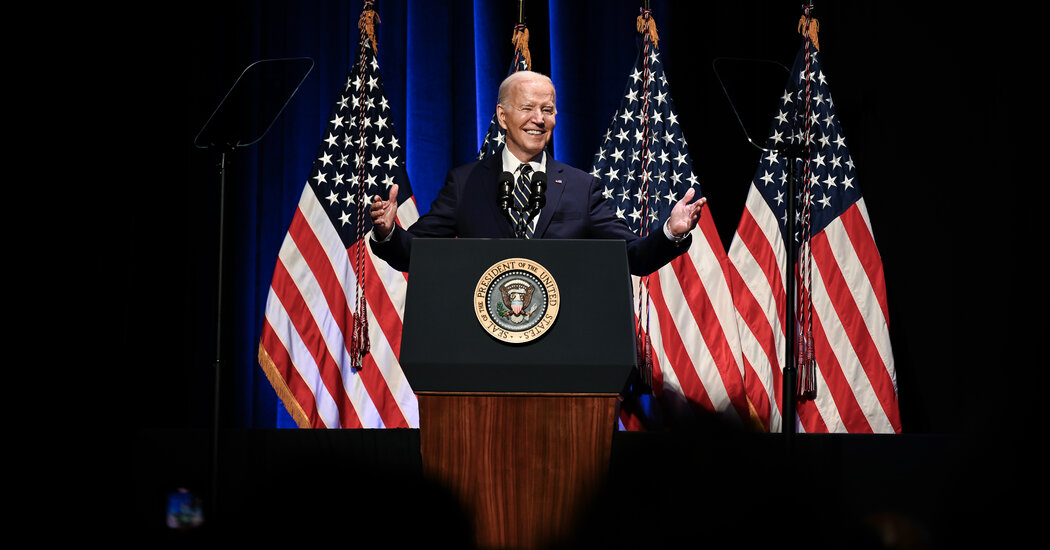The Morning Digest is compiled by David Nir, Jeff Singer, and Stephen Wolf, with additional contributions from the Daily Kos Elections team.
Subscribe to The Downballot, our weekly podcast
Leading Off
● NV-03: Republicans have been trying to claw back Nevada’s swingy 3rd Congressional District every cycle since Democrats flipped it in 2016, but their hopes suffered a serious blow on Thursday when their only legitimate candidate, Assemblywoman Heidi Kasama, bailed on the race.
The GOP still has time to find an alternative to take on Democratic Rep. Susie Lee, but the same problem that reportedly hampered Kasama—poor fundraising—is likely to grow even more acute for any replacement, given the shorter timeframe. And with House Republicans mostly playing defense in 2024, they can ill afford to let an opportunity to go on offense slip away.
Read more about how the GOP just crapped out in Vegas at Daily Kos Elections.
4Q Fundraising
- NJ-Sen: Andy Kim (D): $1.75 million raised, $2.6 million cash on hand
- IN-Gov: Mike Braun (R): $2 million raised (in six months), $4 million cash on hand
- IA-03: Lanon Baccam (D): $500,000 raised (in seven weeks)
- NC-01: Laurie Buckhout (R): $250,000 raised (in eight weeks), $1.26 million cash on hand
- VA-10: Krystle Kaul (D): $150,000 raised (in 10 weeks), additional $451,000 self-funded
- WI-03: Rebecca Cooke (D): $325,000 raised
Senate
● OH-Sen: Rep. Warren Davidson, a hardliner who spent part of last year mulling his own Senate campaign, has endorsed rich guy Bernie Moreno for the March 19 Republican primary.
New data from AdImpact also shows Moreno maintaining an advantage on the airwaves. Moreno has spent or reserved $4 million, compared to $3 million for state Sen. Matt Dolan. Secretary of State Frank LaRose, who is the only major Republican who isn’t capable of significant self-funding, has not yet gone on the air.
Governors
● WA-Gov: The latest fundraising data from Washington’s open-seat governor’s race shows that Democratic Attorney General Bob Ferguson took in four times as much cash as his main rival, former GOP Rep. Dave Reichert, through the end of 2023. Ferguson outpaced Reichert $5.6 million to $1.2 million, a haul that includes the $1.2 million in “surplus funds” that the Democrat transferred from the campaign account he’d used in his previous races for his current post. Ferguson also outspent the former congressman $1.1 million to $523,000 over the course of the year, though the state does not include each candidate’s cash on hand.
A third Democrat, state Sen. Mark Mullet, took in $1 million and spent $403,000. Former Richland school board member Semi Bird, a Republican who was recalled from office in August, hauled in $296,000 and spent a similar $270,000. Both Ferguson and Mullet will be barred from fundraising over the next two months while the legislature meets, but that prohibition doesn’t apply to candidates who aren’t state officials, such as Reichert and Bird.
House
● California: The California secretary of state’s office released a certified list of candidates on Dec. 28 for the March 5 top-two primary, and a few candidates who had previously announced congressional campaigns did not end up filing. One … unusual … contender also filed to run under a different party label than the one he originally announced with.
● CA-12: Businessman Tim Sanchez, a Democrat who had the support of VoteVets, announced in early December that he was ending his campaign to replace Senate candidate Barbara Lee in this dark blue East Bay seat.
● CA-13: Financial advisor Phil Arballo, a Democrat who unsuccessfully ran for Congress during each of the previous two cycles, did not file to take on GOP Rep. John Duarte in this competitive Central Valley constituency despite announcing a third bid last year.
● CA-30: Tech businessman Joshua Bocanegra, best known for forming a company dedicated to bringing back the dead, is campaigning without a party affiliation after initially running as a Democrat. Bocanegra had struggled to attract attention in the crowded contest to succeed Senate candidate Adam Schiff in this safely blue seat in the Los Angeles area.
● CA-31: Baldwin Park Planning Commissioner Ricardo Vazques is no longer running to replace his fellow Democrat, retiring Rep. Grace Napolitano, in a reliably blue seat in the eastern San Gabriel Valley.
● CA-41: Two Democratic members of Inland Empire city councils, San Jacinto’s Brian Hawkins and Lake Elsinore’s Tim Sheridan, will not be on the ballot to face GOP Rep. Ken Calvert despite previously announcing.
● CA-45: Immigration attorney Jimmy Pham declared in October that he would run for state Assembly rather than continue to compete in the busy Democratic field to face GOP Rep. Michelle Steel in Orange County.
● CA-47: Board of Equalization member Mike Schaefer will not be on the ballot to replace his fellow Democrat, Senate candidate Katie Porter, in Orange County. Schaefer announced he was running back in May, but he never attracted much attention afterward.
● GA-03: Former state Rep. Philip Singleton, a Republican who serves as chief of staff to 6th District Rep. Rich McCormick, has filed FEC paperwork to seek the open 3rd District.
● MO-03: Republican Rep. Blaine Luetkemeyer became the first member of Congress to announce his retirement in the new year on Thursday, a decision that sets off an open seat race for a Missouri constituency that Donald Trump took 62-36 in 2020.
The candidate filing deadline is March 26, and the winner of the Aug. 6 GOP primary should have no trouble succeeding Luetkemeyer in the 3rd District, which includes the east-central part of the state and the St. Louis exurbs. Many names are sure to surface, though state Sen. Mary Elizabeth Coleman was the first to react to the news, tweeting, “Of course I’m considering it!!”
The eight-term congressman’s departure won’t impact the battle for the House, but his decision still came as a surprise to local observers. As St. Louis Public Radio’s Jason Rosenbaum notes, Luetkemeyer appeared well-positioned to succeed North Carolina Rep. Patrick McHenry, who unexpectedly announced his own retirement last month, as the top Republican on the powerful House Financial Services Committee.
Luetkemeyer himself has been safe ever since he was first elected to the House in 2008, though he had to make it through an unexpectedly tight general election battle first. The future congressman won a seat in the state House in 1998, an era when Democrats still held the majority they’d initially won in 1954, though just four years later, Republicans took control.
Luetkemeyer, though, didn’t stick around long to enjoy his party’s new and permanent dominance, as he launched a 2004 bid for state treasurer. Though he lost the primary to the eventual winner, Sarah Steelman, 39-24, he landed on his feet in 2006 when Gov. Matt Blunt appointed him the state’s tourism director. He was still serving in that capacity in 2008 when the unpopular Blunt decided not to seek a second term and GOP Rep. Kenny Hulshof launched what would be a disastrous campaign to replace him.
Luetkemeyer was one of several Republicans who campaigned to succeed Hulshof in the now-defunct 9th District, but he and state Rep. Bob Onder soon emerged as the two frontrunners. The radical anti-tax Club for Growth backed Onder and ran ads attacking Luetkemeyer, but the former tourism chief enjoyed the support of the influential Missouri Right to Life. Luetkemeyer won the primary 40-29, and given that George W. Bush had carried the 9th by a wide 59-41 margin, that should have set him up for an easy victory in the general election.
But the Republican nominee struggled against Democratic state Rep. Judy Baker in what turned out to be the second successive terrible election cycle for the GOP. Luetkemeyer, whom the Swing State Project (our predecessor site) described at the time as “a rather bland” candidate, self-funded to replenish his war chest following his expensive primary battle, a move that may have saved him from defeat. John McCain carried the 9th 55-44, but Luetkemeyer only turned back Baker 50-47.
Despite that close call, however, Luetkemeyer quickly became entrenched. His seat was renumbered the 3rd District after Missouri lost a seat following the 2010 census, but that change didn’t harm his electoral prospects. The congressman spent his career as a reliable hardline vote, including joining the majority of his caucus in voting against recognizing Joe Biden’s victory in the hours after the Jan. 6 riot.
● OH-06: GOP Gov. Mike DeWine announced on Thursday that the special election to succeed Republican Rep. Bill Johnson will take place on June 11, with a primary to coincide with the regular March 19 statewide primary; the filing deadline will be Jan. 19. Johnson has said he will resign on Jan. 21 from this eastern Ohio district, which favored Donald Trump 64-35 in 2020, to become president of Youngstown State University.
Three Republicans filed last month to compete for the full two-year term: state Sen. Michael Rulli, state Rep. Reggie Stoltzfus, and chiropractor Rick Tsai. It would be a surprise if primary voters nominated two different candidates for the special and regular Nov. 5 election, though such things have happened before.
● UT-03, UT-Sen: Two more Republicans have announced that they’re running for the seat that GOP Rep. John Curtis is giving up to run for the Senate: Roosevelt Mayor Rod Bird and state Sen. Mike Kennedy.
Bird, who is the founder of a company that supplies pipes and hoses, had announced in September that would seek to replace retiring Sen. Mitt Romney and would self-fund $1 million for his effort. The mayor, who leads a 7,000-person community, launched his new effort by telling the Deseret News he was a conservative who “wants to work with people.”
Kennedy, by contrast, briefly attracted national attention in 2018 when he ran for the upper chamber as a hardline alternative to Romney. Then-state Rep. Kennedy (who is not related to the Kennedys), narrowly won the party convention, an event that’s long been dominated by activists who are far more ideologically extreme than their party’s electorate at large. But Romney, who had Donald Trump’s endorsement at the time, prevailed with primary voters by a 71-29 margin.
Kennedy revived his career late in 2020 when party delegates picked him to fill a vacant state Senate seat, and he held it two years later without opposition. He has since spent his second stint in the legislature successfully pushing hard-right laws like a ban on gender-affirming care for minors.
Legislatures
● MI Redistricting: Michigan’s independent redistricting commission has voted to appeal last month’s federal court ruling that struck down 13 state Senate and state House districts on the basis that mapmakers relied on race to an unconstitutional degree. The appeal will go directly to the Supreme Court, which is required by federal law to rule on the merits, though the justices can uphold or reverse the lower court without providing a written explanation.
Ad Roundup
Campaign Action


